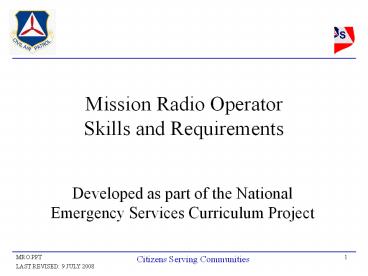Mission Radio Operator Skills and Requirements - PowerPoint PPT Presentation
1 / 20
Title:
Mission Radio Operator Skills and Requirements
Description:
Title: Continuing Education Author: John W. Desmarais Description: Updated 6/03 Brockman Last modified by: jdesmarais Created Date: 5/11/1998 10:05:59 PM – PowerPoint PPT presentation
Number of Views:70
Avg rating:3.0/5.0
Title: Mission Radio Operator Skills and Requirements
1
Mission Radio OperatorSkills and Requirements
- Developed as part of the National Emergency
Services Curriculum Project
2
Whats the role of the Mission Radio Operator
- Mission Base Communications
- Communications support in the Field
- Relay sites
- Staging Areas
- Equipment installation support
3
Basic Procedures
- Mission Radio Operators need to be familiar with
the CAPs basic communications policies and
practices - Basic Radio Operations
- PTT
- RTL
- Prowords and Callsigns
- The basics of the Radiotelephone Procedures Guide
4
Advanced Procedures
- Mission Related Skills that allow our personnel
to send new instructions, report mission
information and track personnel adding a higher
level of safety
- Updating a Status Board
- Knowledge of the local equipment available
- Handling urgency signals and emergency traffic
- And other procedures to support the mission
5
What frequencies to use?
- Simplex Operations
- Duplex Operations
- HF Operations
- Other agencies frequencies
- Check your local operating procedures and
emergency plans before the incident
6
Message Handling
- Formal vs. Informal Traffic
- Message Precedences
- Message Forms Distribution
- Communications Unit Log
7
Choosing a Good Communications Site
- High Ground
- Line of Sight
- Accessibility
- Sources of Radio Interference
8
Regaining Communications
- Check the Radio
- Move to Higher Ground
- Have you tried Duplex?
- Have you tried Relays?
- If necessary or mobile - Move?
- Dont forget about the telephone
9
Scheduled Radio Checks
- When?
- As briefed
- When completing sortie actions
- Departure and returning to Incident Base
- Entering and Leaving Assigned Search or Disaster
Areas - Any extended stop - like meal or fuel breaks
- As prudent Judgement Suggests
10
Scheduled Radio Checks Continued
- Before Calling In at the time required, determine
at minimum - Your location
- Your Status
- Anything you will need from the station you are
calling
11
Scheduled Radio Checks Continued
- When making your radio check give
- The time of the radio check if being relayed or
it was delayed - The teams location
- The teams status
- Dont be afraid to ask for a confirmation and
read-back of critical messages
12
Send a Position Report
- When assigned to support a team in the field,
aircrew or ground team, it will probably be
necessary for you to report your location.
- Know where you are, not only coordinates but also
land marks - Transmit your location clearly and calmly
- Confirm the location received your transmission
properly by requesting a read back
13
Reporting a Clue or a Find
- When supporting a team in the field it may be
necessary for you to transmit the location or
descriptions of a clue or find
- Know the location of the clue or find
- Know the conditions of survivors or victims
- Be sure to have a clear picture of what is
happening on scene - Establish good communications - move if necessary
14
Reporting a Clue or Find Continued
- Follow the report format found in the task guide
- Avoid speculation - no guessing
- Avoid inflammatory or unclear descriptions
- Dont be afraid to use other forms of
communications like cell phones - radio isnt the
only way
15
Safety Procedures
- Do your best to provide a safe environment for
you and the personnel around you - Lightning protection
- Routing, Securing and Marking Cables and Wires as
necessary - Placing antennas so as to avoid RF exposure and
EMI - Ground your communications systems
16
ICS Form 213 General Message
17
ICS Form 214 Unit Log
18
Mission Radio Operator Tasks
- L-0001 Basic Communications Procedures for ES
Operations - L-0002 Perform Radio Operating Procedures
- L-0003 Employ Appropriate Radio Frequencies and
Repeaters - L-0004 Message Handling Procedures
- L-0005 Choose a Good Communications Site
19
Mission Radio Operator Tasks Continued
- L-0006 Take Steps to Regain Communications
- L-0007 Conduct Scheduled Radio Checks
- L-0008 Send a Position Report
- L-0009 Report a Clue or Find
- L-0010 Communications Safety Procedures
- P-0101 Demonstrate the ability to Keep a Log
20
QUESTIONS?
THINK SAFETY!































